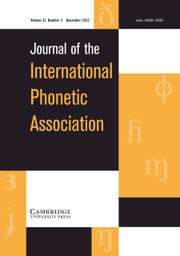Crossref Citations
This article has been cited by the following publications. This list is generated based on data provided by
Crossref.
최태환
2008.
Reduced Vowels of the American English Revisited.
Korean Journal of Linguistics,
Vol. 33,
Issue. 4,
p.
953.
Flemming, Edward
2009.
Phonological Weakness in English.
p.
78.
Ball, Martin J.
Müller, Nicole
Klopfenstein, Marie
and
Rutter, Ben
2010.
My Client Is Using Non-English Sounds! A Tutorial in Advanced Phonetic Transcription Part II: Vowels and Diacritics.
Contemporary Issues in Communication Science and Disorders,
Vol. 37,
Issue. Fall,
p.
103.
Perry, Conrad
Ziegler, Johannes C.
and
Zorzi, Marco
2010.
Beyond single syllables: Large-scale modeling of reading aloud with the Connectionist Dual Process (CDP++) model.
Cognitive Psychology,
Vol. 61,
Issue. 2,
p.
106.
조현관
2010.
영어 schwa /ə/에 대한 음성분석.
The Journal of Studies in Language,
Vol. 26,
Issue. 2,
p.
359.
Beke, András
and
Szaszák, György
2010.
Automatic recognition of schwa variants in spontaneous Hungarian speech.
Acta Linguistica Hungarica,
Vol. 57,
Issue. 2-3,
p.
329.
Davidson, Lisa
2010.
Phonetic bases of similarities in cross-language production: Evidence from English and Catalan.
Journal of Phonetics,
Vol. 38,
Issue. 2,
p.
272.
2011.
The Handbook of Phonological Theory.
p.
779.
Han, Jeong-Im
Hwang, Jong-Bai
and
Choi, Tae-Hwan
2011.
The acquisition of phonetic details: Evidence from the production of English reduced vowels by Korean learners.
Second Language Research,
Vol. 27,
Issue. 4,
p.
535.
Kim, Kyumin
and
Kochetov, Alexei
2011.
Phonology and phonetics of epenthetic vowels in loanwords: Experimental evidence from Korean.
Lingua,
Vol. 121,
Issue. 3,
p.
511.
Bürki, Audrey
Alario, F. Xavier
and
Frauenfelder, Ulrich H.
2011.
Lexical representation of phonological variants: Evidence from pseudohomophone effects in different regiolects.
Journal of Memory and Language,
Vol. 64,
Issue. 4,
p.
424.
Silverman, Daniel
2011.
The Blackwell Companion to Phonology.
p.
1.
Braun, Bettina
Lemhöfer, Kristin
and
Mani, Nivedita
2011.
Perceiving unstressed vowels in foreign-accented English.
The Journal of the Acoustical Society of America,
Vol. 129,
Issue. 1,
p.
376.
Volín, Jan
Weingartová, Lenka
and
Skarnitzl, Radek
2013.
Spectral Characteristics of Schwa in Czech Accented English.
Research in Language,
Vol. 11,
Issue. 1,
p.
31.
Bricker, Victoria R.
and
Orie, Olanike O.
2014.
Schwa in the Modern Yucatecan Languages and Orthographic Evidence of Its Presence in Colonial Yucatecan Maya, Colonial Chontal, and Precolumbian Maya Hieroglyphic Texts.
International Journal of American Linguistics,
Vol. 80,
Issue. 2,
p.
175.
Bekker, Ian
2014.
The weak vowels of South African English: A critical review and comparative acoustic analysis.
Southern African Linguistics and Applied Language Studies,
Vol. 32,
Issue. 1,
p.
133.
Wilson, Colin
Davidson, Lisa
and
Martin, Sean
2014.
Effects of acoustic–phonetic detail on cross-language speech production.
Journal of Memory and Language,
Vol. 77,
Issue. ,
p.
1.
Daland, Robert
Oh, Mira
and
Kim, Syejeong
2015.
When in doubt, read the instructions: Orthographic effects in loanword adaptation.
Lingua,
Vol. 159,
Issue. ,
p.
70.
Rittenhouse, Rose
2015.
Hypercorrection in Wisconsin High German: The Realization of Schwa.
American Speech,
Vol. 90,
Issue. 4,
p.
479.
Lammert, Adam
Goldstein, Louis
Ramanarayanan, Vikram
and
Narayanan, Shrikanth
2015.
Gestural Control in the English Past-Tense Suffix: An Articulatory Study Using Real-Time MRI.
Phonetica,
Vol. 71,
Issue. 4,
p.
229.


